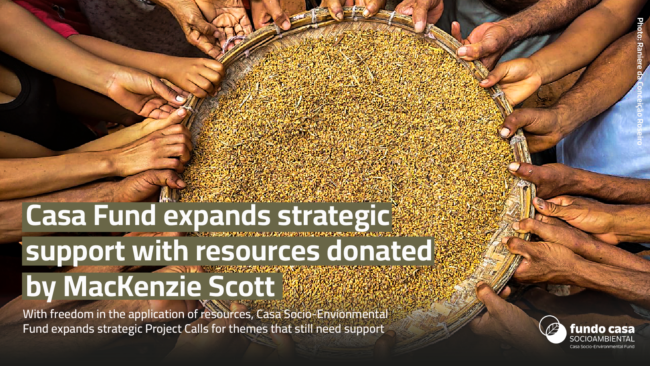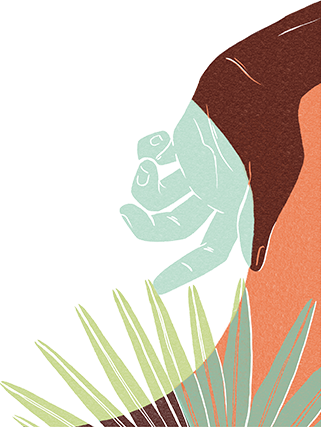 21.06.2023
21.06.2023
Casa Fund expands strategic support with resources donated by MacKenzie Scott
With freedom in the application of resources, Casa Socio-Envionmental Fund expands strategic Project Calls for themes that still need support
Boosting local initiatives in a systemic and distributed way is one of Casa Fund’s strategies, which is how we supported more than 3,000 projects throughout Brazil and South America over the last 18 years. And it was with a similar strategy that the American philanthropist Mackenzie Scott donated, in 2022 alone, US$3.8 billion to 465 organizations around the world. Of this total, 16 are Brazilian organizations, including 7 local funds for social justice and community foundations. Despite having different approaches, all Brazilian organizations supported by Scott have something in common: they develop initiatives that seek to solve social problems through systemic solutions. Another common strategy of many of its supporters is the fact that they are activist funds from the Global South. In addition to the Brazilian funds, Scott also donated approximately US$160 million to women’s funds around the world at the same time.
Being among the organizations supported by Scott is an important recognition for Casa Fund, it means years of work and lifetimes of dedication. For us, it’s more than a gesture of trust, it’s a message that says we’re on the right path. Now it’s time to make these resources reach the communities and people who are the real protagonists and creators of the changes we want to see in the world. Casa Fund received approximately US$5 million from Mackenzie Scott and the objective is for this resource to be used mostly for direct support to projects over the next few years, in a careful way, to complement support strategies that include themes and populations that other funders still do not adequately value.
The main differential of this resource is the freedom given to all the contemplated organizations to apply where they believe to be more strategic for their field of action and mission. For Casa Fund, it is a great differential to be able to donate to themes that are important, but lack support because they are not on the radar of most funders, but they are on ours, because we work very close to the base. We will also be able to strengthen and expand donations to areas that we already support, but whose resources we are able to raise have been insufficient to make a real difference in the field.
For Maria Amália Souza, founder and Director of Strategic Development of Casa Fund, Mackenzie Scott’s way of donating is innovative because “it breaks from the traditional philanthropy in the North that imposes a pre-defined agenda for us by them and their consultants – supposed specialists in our regions and problems. Precisely because of this conventional way of acting, until today the most strategic groups for the protection of the most important global biomes have not had due access to resources. From the moment that we ourselves, who are part of the broad environmental protection and social justice movements of the Global South, can determine where resources are lacking, and guide them into the hands of the most invisible groups to philanthropy, is that the results so sought after finally begin to happen.” As MacKenzie Scott herself says, in the text in which she disclosed her donations: “Equity can only be achieved when all the people involved have the opportunity to help resolve it. […] When our donation team focuses on any system where people are fighting over an issue, we don’t assume that we, or any other group in particular, might know how to fix it. We don’t advocate for any particular policy or reform. Rather, we look for a portfolio of organizations that support the ability for all people to participate in solutions.”
It was thanks to these resources that Casa Fund was able to open for the first time a projects call with an exclusive focus on the Atlantic Forest, which is often left aside in the face of the countless urgencies that plague the Amazon and the Pantanal, for example. Recently, the Atlantic region that remains is once again threatened by projects that aim to make forest deforestation more flexible. In this first open project call for the biome, Casa Fund will support 45 projects, totaling US$360.000 in direct donations to communities and initiatives that seek to create solutions for the socio-environmental challenges faced in the biome. Casa Fund is seeking partners to expand this program in the coming years, as we have done with several other strategic approaches that grow in partnerships.
In April, around US$54.000 donated by Mackenzie Scott was added to resources from the GAGGA Alliance (Global Alliance for Green and Gender Action) and the French Embassy in Brazil, to support initiatives by community-based organizations led by women, with the objective of strengthening the voices, leadership and resilience of these women on the front lines of climate action throughout the national territory. The call ended its enrollment on May 12, and will support up to 24 projects of US$7.000 each, totaling US$168.000 in direct donations to these organizations.
By the end of the year, another US$600.000 will be donated by Casa Fund and this amount should include an exclusive call to support projects in quilombola communities and the support will continue in the following years. According to Cristina Orpheo, Executive Director of Casa Fund, “Mackenzie Scott’s way of donating is inspiring, as it is based on informed trust. It makes it´s choices based on a broad and meticulous survey of the institutional capacity of each of it´s supporters. in the transforming power of trust relationships that Casa Fund promotes socio-environmental justice, making these resources reach where they are needed, in the ideal amount and at the right time. Community-based groups are fully capable of creating and executing robust and innovative proposals, as well as how to properly manage your resources. We have complete confidence and incontrovertible proof of this during our long history of direct donations. The time has come, once again, to make the wheel of trust turn.”
